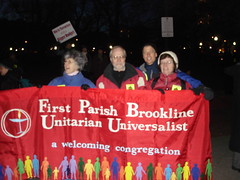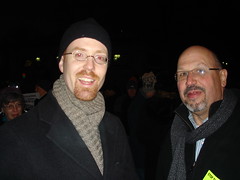Not like the old days

Peace marchers from First Parish in Brookline

Part of the UU delegation from Eastport, Maine

Philocrites and LT bearing prophetic witness
So I'm presiding over a snoozer of a Worship Committee meeting on Wednesday night, when our minister mentions that there's an anti-war protest march on Boston Common Thursday evening and she's thinking of bringing her toddler for his first radical youth indoctrination session. This is the same peace march that PeaceBang, Philocrites, and LT had been blogging about earlier in the day, so my ears perk up.
Along with the ears of the other boomers around the table. "Maybe I should go too. I haven't been to a protest march in years," says one mother of college kids.
"Me neither," I respond. "I think the last time I did one was with the Clamshell Alliance. Gee, that must have been almost 30 years ago now."
"You were there? So was I! Some people got arrested at that one, but not me," she says.
"Yeah, there were a few arrests, but as I recall, it was mostly a big beach party," I agree. "I remember lots of good ones when I was growing up in Washington, DC, though. Arm bands and tear gas."
"Really? You got gassed? Wow!"
"No, not really. I did wear an arm band and a surgical mask and march in the first Earth Day. I was in junior high and too young to join in the Vietnam protests, where things could turn violent pretty quickly, but sometimes my parents let me go watch. A couple times I was close enough to catch whiffs of the gas. You could say I was collateral damage."
Ah, to be a boomer in the good old days: when citizens' festering anger at their criminal, murderous government regularly boiled over into the public square; when the barricades in the streets were thrown up by stirred-up mobs bent on taking it to The Man rather than polite beat cops doing routine crowd control; when curious adolescents getting a whiff of tear gas was a relatively civil outcome; and when campus bombings by revolutionaries and innocent sorority sisters lying dead from National Guard bullets were always a dangerous possibility.
So at 4:30 PM on Thursday, with a touch of nostalgia and not a little surprise at my own impulsiveness, I'm donning my bobo chic Columbia ski parka, stepping out of the office, and calling Philocrites on my cellphone to arrange where on Boston Common to meet him. The organizers had asked for online signups in advance because the event could only accommodate a crowd of 10,000, but I hadn't bothered. When I get there I realize that I was right not to. It's the middle of the evening rush hour, smack dab in front of the entrance to one of Boston's busiest subway stations, in the bluest of blue states, the state that gave Kerry and the Kennedys their careers, the only state to vote for McGovern in 1972, and there's a crowd of maybe 200 protesters, tops.
I look around for people I recognize. PeaceBang had a conflicting appointment in Providence. My own minister is apparently a no-show. I find a delegation from First Parish in Brookline. I find a few UUs from Eastport, Maine, and I remember the winter when I lived Down East and would have jumped at an excuse to make it to Boston or any other big city in January. I meet up with Philo who's wearing a dapper black topcoat, and he in turn assembles LT of Lively Tradition, Anita Farber-Robertson of First Parish in Cambridge, and a few of his colleagues from 25 Beacon.
It's 4:45, the festivities started at 4:00, and all the good speakers have already finished. Random people you haven't heard of are taking turns at the mikes offering banal exhortations and commentary that aren't a quarter as good as what you can find in the lefty blogosphere every day. There's a silent performance art troupe of identical triplets standing like statues, but there's no music or crowd singing. The cops have set up crowd control fences to keep the subway entrances from being blocked, but people are walking back and forth through them and the cops are just standing around chatting.
Maybe half the crowd is grassroots citizens, and the other half is fringe people dressed oddly and buttonholing strangers to harangue them about their own obscure pet injustices. One guy is wearing old dinner spoons for earrings and various other accessories that look like they were salvaged from the town landfill, and is trying to bend Philo's and Anita's ears about some pressing personal grievance, until Philo interrupts him. "Look, sir," Philo says," you're trying to build a broad movement here, and from the size of this crowd it seems there's a lot left to do. You should be working toward that end, not against it."
After about 45 minutes I excuse myself from Philo and friends and head home. I'm a suburban dad, and dinner calls. The next day, I can't find any coverage in the local newspaper.
I'm glad I went, but I can't help wonder why, when the choices our country is facing are so fraught, and the public is so opposed to the course our President urges, this public demonstration was so anemic. Partly, I think, we're hoping our Congress has actually heard us this time. Partly, I think, it's that the burdens don't yet hit most of us where we live -- in contrast to the '60's when legally entrenched discrimination and the draft affected huge swathes of the entire populace, including an unemployed student population with the time on their hands to devote to the cause. Partly, I think, it's that the blogoshere is becoming an alternative to the soapbox as a vehicle for public expression.
But partly also, I think, it's a failure of courage, leadership and imagination on the left. When I was growing up in Washington, the dean of the National Cathedral, Francis Sayre, grandson of Woodrow Wilson, was one of the strongest and most reliable voices of conscience in the protests. Last Thursday, right under the steeple of the Park Street Church, and within a block of 25 Beacon Street, St. Paul's Episcopal Cathedral, the Tremont Temple, Congregational House, and King's Chapel, there were clergy in the crowd, but there were no William Sloane Coffins or Martin Luther Kings at the microphones. Within a block of the State House and the graves of John Winthrop, John Hancock, Paul Revere, Sam Adams, and the Boston Massacre victims, within a block of the memorial to our own Robert Gould Shaw, there were no Gene McCarthys or Bobby Kennedys or Benjamin Spocks --or John Kerrys! -- at the podium. There was a lonely guy sitting on a park bench strumming a guitar, but there were no Phil Ochses or Pete Seegers or Bob Dylans or Peter, Paul & Marys or Joan Baezes on the stage uniting the crowd in song. In fact, there wasn't even a stage.
I will lift up mine eyes unto the hills; from whence cometh my help?

5 Comments:
I so hoped you would write about that protest.
A small part of the issue might have been that the protesters spread themselves pretty thin in your area. The link at Peacebang took me to a page showing that there were something like a dozen events near her.
There were only three near me and I live ten miles from the white house.
The protests in Washington DC were a little more lively
CC
UUA President Bill Sinkford is on public record as saying "just say NO! didn't work in the Garden of Eden". It looks like just saying NO! didn't work very well in Boston Common either. . . Where was President Sinkford anyway
Where was Sinkford? Not there, but then again, neither were any other of all those big-shot clergy from all those other denominations and faiths who made such a big show only a few days ago out of swearing in Deval Patrick, the prep-school and Harvard College Old Boy who may be Massachusetts' first nonwhite governor but hardly its first Crimson one.
Sorry to have been a no-show; though now I'm glad I didn't schlep my very cranky toddler into the cold with my desk piled with work to be finished for the brief 3 hours I had to spend with him before returning to church meetings.
Just for the record, the Maine Unitarians weren't there because they craved the comforts of Boston after a life stuck in the hinterlands. They were there because one of them has cancer and they were stuck in the city for the week seeing the doc. Not that they aren't fond of Boston, but they'd have been just as happy staying home and organizing something there.. And they, too, were disappointed at the turnout. Back home, in a town of 1,640, their weekly vigil in front of the post office, is proportionately MUCH larger, so they expected the Boston event to be huge. Burnout, I suppose.
Post a Comment
<< Home